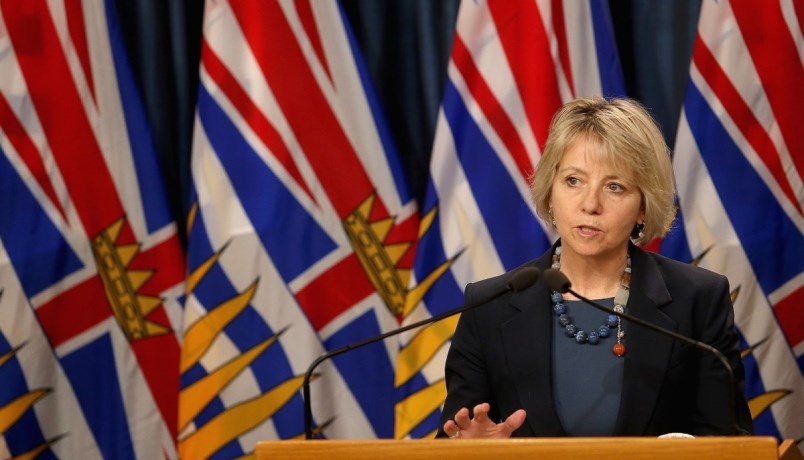One-day growth in the number of COVID-19 cases in the province increased by 35 to 1,445, with three new deaths reported on Saturday.
There were no new cases reported in the Northern Health region and the number remains at 26.
By region, Coastal Health now has 642 cases, Fraser Health has 558, Interior Health has 135 and Vancouver Island Health has 84.
With this being the Easter long weekend, provincial health officer Bonnie Henry in a Victoria news conference reminded people of the need to stay home whenever possible and avoid all unnecessary travel.
“All across the province we know these physical distancing measures are in place and we know they are so important to be able to continue the trend that we are having in managing this pandemic,” said Henry. “I want to say thank you for staying home and putting unnecessary strain on our small communities around the province. We want to make sure we’re not taking services and support away from those who live locally and need it.”
B.C. on Friday implemented border controls at land crossings and airports which require travelers from out of province to show to provincial and federal authorities they have a formal plan with supports to go into 14 days of isolation. Failing that, they will be sent to a quarantine facility for the 14-day period.
Henry said there is no need to step up enforcement of travel restrictions or force people to stay confined to their homes because people are following that advice voluntarily.
“I know most people are doing the right thing and there are many reasons why people may need to travel, some of them are very legitimate reasons,” said Henry. “I don’t believe there’s a need for lockdown or any of those type of measures. We are doing it in here B.C. and it’s thanks to everybody doing their part.
“What happens this weekend is going to be reflected in what we see in the coming weeks, and we do not want to see increasing numbers of cases, increasing challenges in our health care system, That is what we doing everything in B.C. to avoid and I know the vast majority of people are on our side on this and are holding the line, and I thank you for that.”
In BC, 58 people have died as a result of the coronavirus outbreak.
“Almost all of our deaths are in elderly people, with one exception, a young man in his 40s,” said Henry. “We have seen a shift to over 70, over 80 and a number of deaths of people in their 90s.
“But the bulk of our cases, the people who become sick with this, are actually in the 29-40 age group and that reflects that there’s a lot of health-care workers who have been tested and have this illness. Many of them have had very mild illness, but a number of them have been hospitalized. People in their 20s and 30s are not immune to having severe illness with this. We’ve had very few cases under the age of 19. As we’ve seen around the world, young children are relatively spared from this, which is a good thing.”
There were no new cases from Friday to Saturday discovered at longterm care or assisted-living facilities in the province. COVID-19 has been confirmed at 20 care facilities with 246 cases reported. Of that total, 153 are residents and 93 are staff members.
An outbreak at a federal jail in Mission, the medium-security Mission Institution, has 26 inmates and staff affected (up from two cases a week ago) and five of those patients have been admitted to hospital. Henry said two cases have been confirmed at the Okanagan Correctional Centre in Oliver.
B.C. hospitals currently have 134 COVID-19 patients, 63 of whom are being treated in critical care or intensive care units. There have been 905 people in the province who have fully recovered.
Henry said health care facilities in B.C. are reasonably well-stocked with personal protection equipment and other medical supplies needed in the fight against COVID-19 but the province is not yet able to send supplies to other provinces such as Ontario or Quebec, as Alberta has done.
“We’re in an OK place right now in B.C. for all of the equipment that we need but we are continuing to get what we need for the future and making sure we are supporting across the country,” said Henry. “
“We’re not in a place where we have enough to share. But there is really good coordination across the country to make sure everybody has what they need and if hot spots arise, equipment comes.”
B.C. has been testing about 1,000 patients for COVID-19 daily despite having a capacity to test as many as 3,000 people per day. Henry said the percentage of positive tests has been rising, which is an indicator the people they are targeting are more likely to test positive.
“Our capacity has increased across the province and one of the main reasons why we’re not seeing a lot of increased testing is because we are seeing fewer people with respiratory illness that are being sent for testing,” she said. “I expect we’ll continue to increase the amount of testing but we know there are fewer people coming back from other countries and that was a large part of where illness was arising.
“We are continuing to test widely in our longterm care facility outbreaks. Older people can have very mild symptoms sometimes, it can be just an increase in fatigue or lack of appetite, so we are testing very actively in those settings and our outbreak settings. But we’ve seen a decrease in health-care workers becoming ill, so that’s a partly a good thing and it’s partly a reflection of the amount of respiratory illness that’s in our community right now.”



